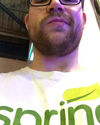Conférence Java
Java
Today's applications don't exist in isolation. REST applications and web services are a great way to connect applications together. REST is a design principle that imposes no constraints on the client except basic HTTP support, which all platforms provide. Designing REST services, however, is still as much art as it is science, as standards are emerging. Join Spring Developer Advocate Josh Long as he introduces some of the ins-and-outs of REST AP
Java
Traditional concurrent development on the Java Platform requires in depth knowledge of threads, locks, and queues. Fortunately, new languages and frameworks have made concurrent programming easier. In this session, I will demonstrate several concurrent processing techniques including Fire and Forget, Fork-Join, and Asynchronous Web Services using the Java Concurrency Library, the Akka Framework and the Spring Framework.
Java
The Java EE 7 platform focuses on Boosting Productivity and Embracing HTML5. WebSocket, JSON Parsing, Batch Processing, and Concurrency Utilities are new additions to the platform. JAX-RS 2 and JMS2 are heavily updated with features and simplicity. This code-driven session will provide a comprehensive introduction to the updated Java EE 7 platform using GlassFish 4.
Java
Integrating 2 or more systems seems to be easy. However, depending how complex the systems are this task can become a nightmare and the final product becomes messy and hard to maintain. This talk will show some graceful patterns to integrate systems - the Enterprise Integration Patterns (EIPs), explaining how to apply them in Java EE with JBoss Fuse, Apache Camel and OSGi.
Java
Today’s interconnected world requires that organizations rapidly deliver flexible-integrated solutions. The conventional approach is to integrate heterogeneous applications using web services but unfortunately that tends to tightly couple those applications. In this session we will explore several alternatives for achieving Enterprise Integration Agility with examples using ActiveMQ/Camel, Mule ESB, and NetKernel.
Java
With the release of version 8, functional programming has finally come to Java – bringing a brand new way of thinking about code. But will this mesh with Java’s object-oriented legacy or will Java just become... dysfunctional? This talk will answer all plus explore lambdas, functional interfaces and the refreshed functionally-flavored Collections library. Prepare to see Java in whole new way!
Java
This session provides a primer on WebSocket and Server-Sent Events and their supported use cases. It explains WebSocket support in the Java programming model, from a simple annotation-driven programming model and integration in the Java EE containers using JSR 356. The session also explains how Server-Sent Events can be easily written using Jersey, the Reference Implementation for JAX-RS 2. All of this support is available in Java EE 7.
Java
This presentation begins with a basic introduction to MongoDB and how data is organized. It covers several options for interacting with MongoDB and then walks through an example JPA application and then a version for MongoDB. It also explores how MongoDB’s paradigm can affect not only your object model but how you interact with the data as well.
Java
Data challenges today are as demanding as they are exotic. From data ingestion, online transaction processing, offline batch processing, and integration with specialized domain models to the data-grid, NoSQL store, clustered file system and search index, Pivotal's data stack (Reactor, Spring Data, Spring XD, Spring Integration and Spring Batch along with Pivotal GemFire, Redis, and HD) has got you covered.
Java
Let's get back to simplicity when doing Java web development. Forget about DI frameworks, ORMs and complex build tools and see how we can develop well-tested, well-crafted web applications using only simple tools, libraries and techniques.
In this talk, I will share my experience rewriting a web application based on Spring MVC, Spring, Hibernate and Maven with only Simple and JDBC. We'll discuss the benefits and challenges of simplicity.
In this talk, I will share my experience rewriting a web application based on Spring MVC, Spring, Hibernate and Maven with only Simple and JDBC. We'll discuss the benefits and challenges of simplicity.
Java
In this new wave of wearable computing, Google Glass is an exciting device that could change the way we interact with technology. In this session, you'll learn how to write PHP & Java apps for Glass, get live demos, and real best practices. The first part will focus on PHP, we'll go deep in code & learn how we built Stereo, the first music streaming media player for Glass. In part two, you will learn how to write Java Android apps for the device.
© 2010-2025 ConFoo. Tous droits réservés. Code de conduite
Gestion des Cookies
Pour offrir une bonne expérience, l'utilisation de cookies est nécessaire. Certains sont essentiels au bon fonctionnement du site, tandis que d'autres nous aident à mieux répondre à vos intérêts.






















